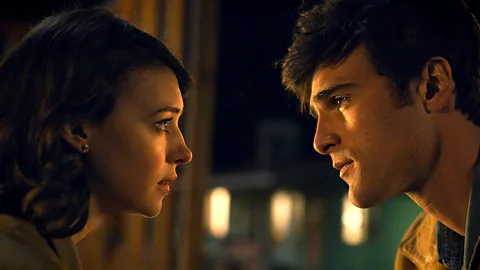 Tiff
TiffAmong the stellar cast, Edgar-Jones gives a particularly beautiful and understated performance as a woman struggling with homosexuality, but the film has too much story for its own good.
In its skeletal plot, On Swift Horses sounds like a love triangle, or maybe a love square, set in the repressed 1950s. Daisy Edgar-Jones and Will Poulter play Muriel and Lee, a young couple who move from Kansas to California, and Jacob Elordi plays Lee’s brother, Julius. It’s clear from the beginning that Muriel feels more obliged than excited about marrying Lee, and that there is a strong bond between her and her brother-in-law. Instead of focusing on a love triangle centered on Muriel, as expected, the film attempts something more nuanced and complex. The sparks between Muriel and Julius are not sexual. He goes to Las Vegas and has a passionate affair with Henry (Diego Calva), while Muriel struggles with her own unhappiness and her attraction to women. It’s a story of machinations, secrets and realizations that are rarely spoken about. And it works much better as an idea than as a film.
Despite Edgar Jones’s beautifully understated performance, On Swift Horse only occasionally comes to life. Its sluggish pace gives it a mundane feel. Its style is not natural or convincing enough to draw us into its fictional world, nor is it stylized enough to be poetic. Director Daniel Minahan, best known for TV series such as Fellow Travelers, has crafted a thoughtfully conceived but largely lifeless film.
The film sees Julius and Muriel’s journeys running largely parallel to one another, mirroring each other’s, and Edgar-Jones and Elordi barely ever come face to face, which may explain why Julius’s claim that they instinctively know each other, homosexuality included, is less convincing.
The film is light and bright at times. In San Diego, Muriel wears a ladylike ’50s hat to the racetrack, but keeps that fact and most of her winnings secret, hiding the money in the back of her purse. It’s only the beginning of her secret life. At the track, a classy woman smuggles Muriel a matchbox; it turns out to be a gay hotel and bar, but Muriel doesn’t know it yet. Muriel does know she is attracted to her neighbor, Sandra (Sasha Calle). Edgar Jones captures the secrecy and the thrill of freedom Muriel experiences as she pretends to be a normal wife.
Meanwhile, Julius, a wandering card swindler and con man, takes a real job finding con men for the casino owners of Las Vegas, where he meets Henry, who agrees to team up to rip off the casino. Elordi looks like a good ’50s hottie, but his performance is flat, even when he’s supposed to be intensely attached to Henry. Calva is dynamic as the mercurial Henry, whose love for Julius fluctuates. And let’s face it, Calva was in the role last year when he said he was ” “It’s pretty hot.” The sex scenes with Elordi are all relative. They’re tame compared to The Fellowship of the Ring, which more convincingly portrayed a much more explicit, intense, and passionate gay relationship. It’s no secret that the 1950s was a repressive and homophobic decade, and Coach Man fails to capture the tension and fear Julius feels.
Riding a fast horse
Starring: Daisy Edgar-Jones, Jacob Elordi, Will Poulter, Diego Calva
Poulter is exceptional, revealing layers of consciousness that explain why Lee is more complicated than he seems at first glance. He doesn’t question his marriage and the suburban American dream that everyone wants. But he knows more about his brother than he lets on. “I’m not asking you to change, Julius. I just want you to be safe,” he says. He doesn’t know much about his wife, and gently warns her that Julius is not the man she thinks he is. “He has his own passions, he’s just not like us,” he tells her. When Henry disappears, Julius arrives in San Diego looking for him, but it all falls apart.
Bryce Kass’s screenplay, based on Shannon Pfaffard’s 2019 novel, is overstuffed with story. Muriel Julius’ gambling, the emotional love triangle, and the hidden gay life could have been enough drama on their own to make a movie. Combine them and you get a mountain of problems. In a director’s statement, Minahan said of the film, “Gambling became a code word for homosexuality, and money became a symbol of freedom for our heroes.” It may work as an afterthought and message, but it’s a heavy idea on screen. Swift Horse isn’t a flop, but it’s a disappointment given its lead actors and potential.
Source: BBC Culture – www.bbc.com




